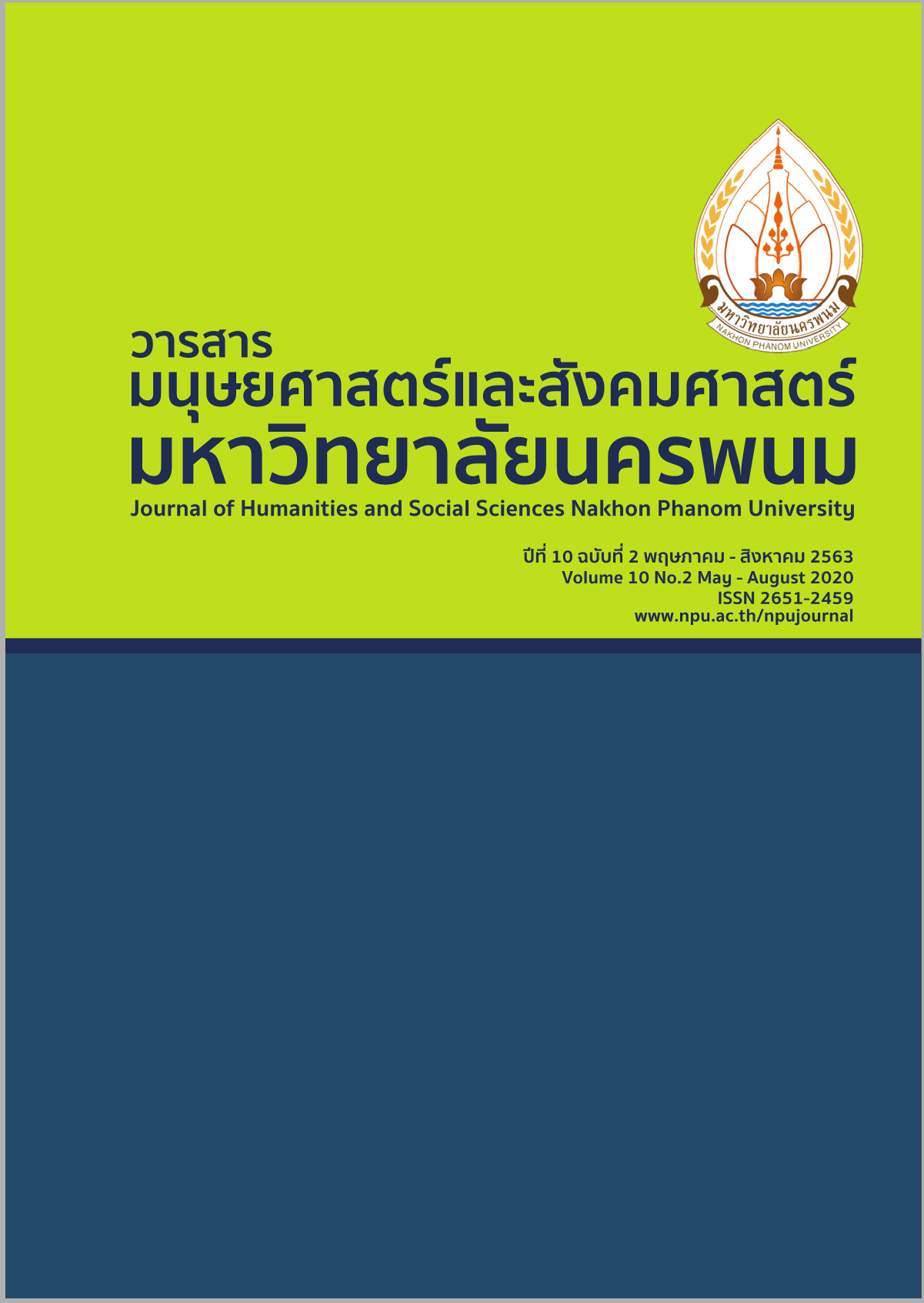Effects of Internal Marketing, Internal Supply Chain Integration and Internal Service Quality on Employee Satisfaction in Convenience stores in Thailand
Main Article Content
Abstract
The purpose of this study is 1) to study the confirmatory elements of internal marketing, Internal supply chain integration, Internal service quality and employee satisfaction in convenience store in Thailand (2) to analyze the causal direct and indirect relationship of effect of internal marketing, Internal supply chain integration, Internal service quality towards employee satisfaction in convenience store in Thailand.
Samples consisted of frontline employee of 7-Eleven. Sampling was done of 450 people. This study used the online questionnaire to correct the data. The data received were calculated and analyzed using descriptive statistics (frequency, percentage, mean and standard deviation). The path analysis was used to test the hypotheses. The Structural equation modeling (SEM) was used to test the model.
The results of the study showed that internal marketing, internal supply chain integration, and internal service quality innovation direct and indirect to employee satisfaction. The causal model developed is appropriate. Because they are consistent with the empirical data. Elements of the model are accurate (Validity) and have the ability to predict & are an acceptable level.
Article Details
References
คำนาย อภิปรัชญาสกุล. (2557). ความรู้เบื้องต้นเกี่ยวกับธุรกิจค้าปลีก. กรุงเทพฯ: โฟกัสมีเดีย แอนด์ พับลิชชิ่ง.
สมาคมพัฒนาผู้ประกอบการธุรกิจค้าปลีกทุนไทย. (2562). แนวโน้มธุรกิจค้าปลีกในปี 2562. เข้าถึงเมื่อ 9 ธันวาคม พ.ศ. 2562 สืบค้นจาก http://theretail.wordpress.com/2019/09/28.
Ahmed, P.K., Rafiq, M. & Saad, N.M. (2003). Internal Marketing & the Mediating Role of Organizational Competencies. European Journal of Marketing, 37, 1221-1241.
Amjad Abu ELSamen & Mohammad Alshraideh. (2012). The impact of internal marketing on internal service quality: A case study in a Jordanian pharmaceutical company. International Journal of Business & Management, 7(9), 84-95.
Ansari, Asim, Carl Mela, & Scott Neslin. (2008). Customer Channel Migration. Journal of Marketing Research, 45(1), 60-76.
Baofeng Huo, Yuxiao Ye, Xiande Zhao & Yongyi Shou. (2016). The impact of human capital on supply chain integration & competitive performance. International Journal of Production Economics, 178 (C), 132-143.
Bellou, V. & Anronikidis, A. (2008). The impact of internal service quality on customer service behaviour: Evidence from the banking sector. International Journal of Quality & Reliability Management, 25(9), 943-954.
Bouranta, Nancy, Ghitris, Leonidas & Paravantis, John. (2019). The relationship between internal & external service quality. International Journal of Contemporary Hospitality Management, 21(3), 275-293
Bakker, F., Boehme, T., & Donk, D. P. (2012). Identifying barriers to internal supply chain integration using Systems Thinking. Paper presented at 4th Production & Operations Management World Conference, Natherlands. Retrieved from http://ro.uow.edu.au/cgi/viewcontent.cgi?article=3830&context=commpapers.
Bockerman & Ilmakunnas. (2012). The job satisfaction-productivity nexus: A study using matched survey & register data. INDUSTRIAL & LABOR RELATIONS REVIEW, 65(2), 244-262.
Chen, I.J. & Paulraj, A. (2004). Towards a Theory of Supply Chain Management: The Constructs & Measurements. Journal of Operations Management, 22. 119.
Eddy Balemba Kanyurhi & Déogratias Bugandwa Mungu Akonkwa. (2016). Internal marketing, employee job satisfaction, & perceived organizational performance in microfinance institutions. International Journal of Bank Marketing, 34 (5), 773–796.
Flynn, B. B., Wu, S. J., & Melnyk, S. (2010). Operational capabilities: Hidden in plain view. Business Horizons, 53, 247-256.
Frost, F. A. & Kumar, M. (2000). INTSERVQUAL – An internal adaptation of the GAP model in a large service organisation. Journal of Services Marketing, 14(5), 358-377.
Kuldip Singh. (2016). Influence of Internal Service Quality on Job Performance: A Case Study of Royal Police Department. Procedia - Social & Behavioral Sciences, 224, 28–34.
Prajogo & Olhager. (2012). Supply Chain Integration & Performance: The Effects of Long-Term Relationships, Information Technology and Sharing, and Logistics Integration. International Journal of Production Economics, 135(1), 514-522.
Reza, Javadin, Rayej, Yazdani, Estiri, & Aghamiri. (2012). How organizational citizenship behavior mediates between internal marketing and service quality: The case of Iranian GAS company. International Journal of Quality & Reliability Management, 29(5), 512-530.
Vlachos, P. A., Panagopoulos, N. G., & Rapp, A. A. (2013). Causal Attributions and Employee Reactions to Corporate Social Responsibility. Industrial & Organizational Psychology, 6(4), 334-337.
Schoenherr, T. & Swink, M. (2012). Revisiting the arcs of integration: cross-validations and extensions. Journal of Operations Management, 30(1), 99-115.
Stank, T.P., Keller, S.B. & Closs, D.J. (2001). Performance benefits of supply chain logistical integration. Transportation Journal, 41(2), 32-46.
Tsai & Tang. (2008). The relationship between internal marketing and employee job satisfaction: A study from retail shops in Bangladesh. Journal of Business & Retail Management Research, 12(03), 149-159.
Zhining Wanga, Nianxin Wang. (2012). Knowledge sharing, innovation & firm performance. Expert Systems with Applications, 39, 8899–8908.


